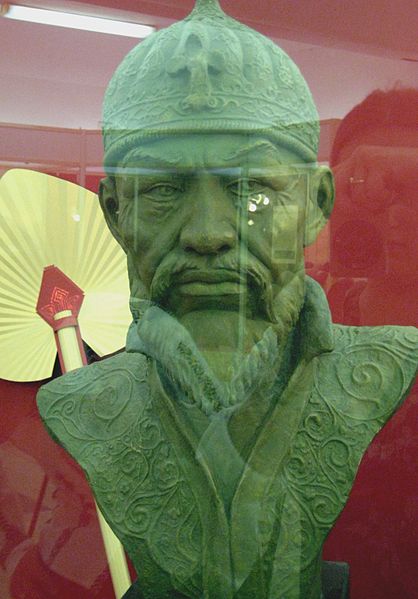Yeah but Timur himself had no connections with Ghengis Khan. His Mother tongue was Chagatai Turkic which is closely related to the Uzbek language. Wikipedia says that this tribe was originally Mongolic that became Turkified but that doesn't count in my eyes.
Timur - Wikipedia, the free encyclopedia
Timur,
Tarmashirin Khan,
Emir Timur,
Timur Beg Gurkhani[1] (
Persian: تیمور
Timūr,
Chagatai:
Temür "iron"; 9 April 1336 – 18 February 1405), historically known as
Tamerlane[2] (
Persian: تيمور لنگ
Timūr(-e) Lang, "Timur the Lame"), was a Turko-Mongol ruler of
Barlas lineage.
Exhumation
A forensic facial reconstruction of Timur by
M. Gerasimov (1941).
Timur's body was
exhumed from his tomb in 1941 by the
Soviet anthropologist Mikhail M. Gerasimov. From his bones it was clear that Timur was a tall and broad chested man with strong cheek bones. Gerasimov reconstructed the likeness of Timur from his skull. At 5 feet 8 inches (1.73 meters), Timur was tall for his era.[
citation needed] Gerasimov also confirmed Timur's lameness due to a hip injury. Gerasimov also found that Timur's facial characteristics conformed to that of fairly Mongoloid features with somewhat Caucasoid admixture.
[77] In the study of "Anthropological composition of the population of Central Asia" shows the cranium of Timur predominate the characters of the South Siberian Mongoloid type.
[94] Timur is classified as being closer to the Mongoloid race with some admixture.
Barlas - Wikipedia, the free encyclopedia
According to the
Secret History of the Mongols, written during the reign of
Ögedei Khan [
r. 1229-1241], the Barlas shared ancestry with the
Borjigin, the imperial clan of
Genghis Khan and his successors, and other
Mongol clans. The leading clan of the Barlas traced its origin to Qarchar Barlas,
[1] head of one of
Chagatai'sregiments. Qarchar Barlas was a descendant of the legendary Mongol warlord
Bodonchir (
Bodon Achir;
Bodon'ar Mungqaq), who was also considered a direct ancestor of
Genghis Khan.
[5]
Due to extensive contacts with the native population of
Central Asia, the tribe had adopted the religion of
Islam,
[2] and the
Chagatai language, a
Turkic language of the
Qarluq branch, which was heavily influenced by
Arabic and
Persian.
[6]





